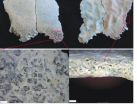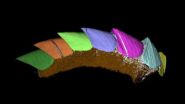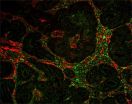(Press-News.org) A fragment of a child's skull discovered at Olduvai Gorge, Tanzania shows the oldest known evidence of anemia caused by a nutritional deficiency, reports a new paper published Oct. 3 in the open access journal PLOS ONE.
The discovery, made by a global team of researchers led by Manuel Domínguez-Rodrigo from Complutense University, Madrid, suggests that early human ancestors began eating meat much earlier in history than previously believed. The skull fragment identified is thought to belong to a child somewhat younger than two and shows bone lesions that commonly result from a lack of B-vitamins in the diet.
Previous reports show that early hominids ate meat, but whether it was a regular part of their diet or only consumed sporadically was not certain. The authors suggest that the bone lesions present in this skull fragment provide support for the idea that meat-eating was common enough that not consuming it could lead to anemia.
Nutritional deficiencies such as anemia are most common at weaning, when children's diets change drastically. The authors suggest that the child may have died at a period when he or she was starting to eat solid foods lacking meat. Alternatively, if the child still depended on the mother's milk, the mother may have been nutritionally deficient for lack of meat.
Both cases imply that "early humans were hunters, and had a physiology adapted to regular meat consumption at least 1.5 million years ago", say the authors.
INFORMATION:
Citation: Dominguez-Rodrigo M, Pickering TR, Diez-Martin F, Mabulla A, Musiba C, et al. (2012) Earliest Porotic Hyperostosis on a 1.5-Million-Year-Old Hominin,
Olduvai Gorge, Tanzania. PLoS ONE 7(10): e46414. doi:10.1371/journal.pone.0046414
Financial Disclosure: Funding provided by the Spanish Ministry of Science and Innovation through the project I+D HAR2010-18952-C02-01 and from the Ministry of Culture through the Archaeological Projects Abroad program. The funders had no role in study design, data collection and analysis, decision to publish, or preparation of the manuscript.
Competing Interest Statement: The authors have declared that no competing interests exist.
PLEASE LINK TO THE SCIENTIFIC ARTICLE IN ONLINE VERSIONS OF YOUR REPORT (URL goes live after the embargo ends):
http://dx.plos.org/10.1371/journal.pone.0046414
Oldest evidence of regular meat consumption by early humans found
1.5-million-year-old skull fragment found in Tanzania shows signs of anemia, suggesting regular meat consumption in early hominids
2012-10-04
ELSE PRESS RELEASES FROM THIS DATE:
Novel blood-based protein signature determined for rare, aggressive lung cancer
2012-10-04
Researchers have discovered a panel of 13 blood proteins that may be effective biomarkers to detect malignant mesothelioma, according to a study published Oct. 3 in the open access journal PLOS ONE by Rachel Ostroff from the company SomaLogic, which developed the new test, and colleagues at other institutions.
Malignant mesothelioma is a rare, aggressive form of lung cancer that can develop after prolonged exposure to asbestos. Because early diagnosis is difficult, most patients face a poor prognosis and have few options for treatment. In the study, authors compared proteins ...
Less is more when choosing between groups of assorted items
2012-10-04
When making decisions about the value of an assortment of different objects, people approximate an average overall value, which though frequently useful can lead to apparently irrational decision-making. A new study published Oct 3 in PLOS ONE by Jerald Kralik and colleagues at Dartmouth College shows for the first time that non-human primates also make similar 'irrational' choices based on approximation.
In the study, researchers found that rhesus monkeys preferred a highly-valued food item (a fruit) alone to the identical item paired with a food of positive but lower ...
Mollusc missing link revealed in 3-D
2012-10-04
Scientists have discovered a rare fossil called Kulindroplax, the missing link between two mollusc groups, which is revealed in a 3D computer model, in research published today in the journal Nature.
The researchers have unearthed the worm-like partly shelled Kulindroplax, which they have modelled in a 3D computer animation. Kulindroplax lived in the sea during the Silurian Period, approximately 425 million years ago, when most life lived in the oceans and the first plants were beginning to grow on land. The team found the Kulindroplax fossil, the only one of its kind ...
Blocking tumor-induced inflammation impacts cancer development
2012-10-04
Researchers at the University of California, San Diego School of Medicine report the discovery of microbial–dependent mechanisms through which some cancers mount an inflammatory response that fuels their development and growth.
The findings are published in the October 3, 2012 Advanced Online Edition of Nature.
The association between chronic inflammation and tumor development has long been known from the early work of German pathologist Rudolph Virchow. Harvard University pathologist Harold Dvorak later compared tumors with "wounds that never heal," noting the similarities ...
Healthcare professionals as bad as patients at good respiratory inhaler technique
2012-10-04
Healthcare professionals are as bad as patients when it comes to knowing how to use inhalers prescribed for asthma and other respiratory conditions correctly, says an editorial in Drug and Therapeutics Bulletin (DTB).
They therefore can't be relied on to teach patients how to use these devices correctly, says DTB.
But as 45 million prescriptions for respiratory inhalers were dispensed in 2011 in England alone—at a cost of £900 million to the NHS—everyone needs to be more clued up on correct inhaler technique to make sure these drugs work well for patients and offer ...
Aspirin may temper brain power decline in elderly women at risk of heart disease
2012-10-04
Daily low dose aspirin could slow the decline in brain power among elderly women at high risk of heart disease, indicates observational research published in the online journal BMJ Open.
The researchers base their findings on 681 women between the ages of 70 and 92, 601 of whom were at high risk of heart disease and stroke, defined as a 10% or greater risk on a validated risk scale (Framingham).
All the women were subjected to a battery of tests to measure their physical health and intellectual capacity, including verbal fluency and memory speed, and dementia (mini ...
Ancient mollusk tells a contrary story
2012-10-04
New Haven, Conn. — A fossil unearthed in Great Britain may end a long-running debate about the mollusks, one of life's most diverse invertebrate groups: Which evolved first, shelled forms like clams and snails, or their shell-less, worm-like relatives?
The small new fossil, found in marine rocks along the English-Welsh border, provides the best fossil evidence yet that the simpler worm-like mollusks evolved from their more anatomically complex shelled brethren, rather than the other way around.
The discovery reinforces previous findings from molecular sequencing studies ...
Southern Hemisphere becoming drier
2012-10-04
A decline in April-May rainfall over south-east Australia is associated with a southward expansion of the subtropical dry-zone according to research published today in Scientific Reports, a primary research journal from the publishers of Nature.
CSIRO scientists Wenju Cai, Tim Cowan and Marcus Thatcher explored why autumn rainfall has been in decline across south-eastern Australia since the 1970s, a period that included the devastating Millennium drought from 1997-2009.
Previous research into what has been driving the decline in autumn rainfall across regions like southern ...
Black hole surprise in ancient star cluster
2012-10-04
Astronomers have made the unexpected discovery of two black holes inside an ancient cluster of stars in our galaxy, the Milky Way.
The research, published today in the prestigious journal Nature, describes the detection of two black holes that are about 10 to 20 times heavier than our Sun in the globular cluster named M22.
Black holes, so dense that even light can't escape them, are what is left when a massive star reaches the end of its life and collapses in on itself.
Co-author Dr James Miller-Jones, from the Curtin University node of the International Centre for ...
Researchers identify dozens of new de novo genetic mutations in schizophrenia
2012-10-04
New York, NY (October 3, 2012) — Columbia University Medical Center (CUMC) researchers have identified dozens of new spontaneous genetic mutations that play a significant role in the development of schizophrenia, adding to the growing list of genetic variants that can contribute to the disease. The study, the largest and most comprehensive of its kind, was published today in the online edition of the journal Nature Genetics.
Although schizophrenia typically onsets during adolescence and early adulthood, many of the mutations were found to affect genes with higher expression ...
LAST 30 PRESS RELEASES:
Ochsner MD Anderson uses groundbreaking TIL therapy to treat advanced melanoma in adults
A heatshield for ‘never-wet’ surfaces: Rice engineering team repels even near-boiling water with low-cost, scalable coating
Skills from being a birder may change—and benefit—your brain
Waterloo researchers turning plastic waste into vinegar
Measuring the expansion of the universe with cosmic fireworks
How horses whinny: Whistling while singing
US newborn hepatitis B virus vaccination rates
When influencers raise a glass, young viewers want to join them
Exposure to alcohol-related social media content and desire to drink among young adults
Access to dialysis facilities in socioeconomically advantaged and disadvantaged communities
Dietary patterns and indicators of cognitive function
New study shows dry powder inhalers can improve patient outcomes and lower environmental impact
Plant hormone therapy could improve global food security
A new Johns Hopkins Medicine study finds sex and menopause-based differences in presentation of early Lyme disease
Students run ‘bee hotels’ across Canada - DNA reveals who’s checking in
SwRI grows capacity to support manufacture of antidotes to combat nerve agent, pesticide exposure in the U.S.
University of Miami business technology department ranked No. 1 in the nation for research productivity
Researchers build ultra-efficient optical sensors shrinking light to a chip
Why laws named after tragedies win public support
Missing geomagnetic reversals in the geomagnetic reversal history
EPA criminal sanctions align with a county’s wealth, not pollution
“Instead of humans, robots”: fully automated catalyst testing technology developed
Lehigh and Rice universities partner with global industry leaders to revolutionize catastrophe modeling
Engineers sharpen gene-editing tools to target cystic fibrosis
Pets can help older adults’ health & well-being, but may strain budgets too
First evidence of WHO ‘critical priority’ fungal pathogen becoming more deadly when co-infected with tuberculosis
World-first safety guide for public use of AI health chatbots
Women may face heart attack risk with a lower plaque level than men
Proximity to nuclear power plants associated with increased cancer mortality
Women’s risk of major cardiac events emerges at lower coronary plaque burden compared to men
[Press-News.org] Oldest evidence of regular meat consumption by early humans found1.5-million-year-old skull fragment found in Tanzania shows signs of anemia, suggesting regular meat consumption in early hominids



